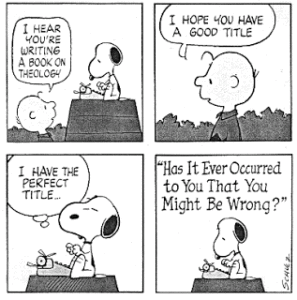I was having a lengthy conversation with a volunteer at a local food pantry. We talked about process and procedures; you know the how of administration of the way they provided the services. The discussion rambled here and there until I made the remark, “Our greatest ministry in the food pantry is not the food, it is the provision of that food without destroying dignity.” But how about those who are gaming the system? Those who use our Christian charity without real need? How about those who drive new luxury cars to pick up food only because it costs them nothing? It is hard to be a part of a ministry to people that really don’t deserve it. What is my attitude to those who do not deserve?
Some would say, “Hate the sin but love the sinner.” But hold on there. That is not from the Bible. It is a quote for Gandhi. Is there a place for hate? Is there a place for intolerance to imperfection?
Proverbs stats quite emphatically:
There are six things that the Lord hates, seven that are an abomination to Him: haughty eyes, a lying tongue, and hands that shed innocent blood, a heart that devises wicked plans, feet that make haste to run to evil, a false witness who breathes out lies and one who sows discord among brothers.
The real issue is the more I study, the more I understand what God expects of me, the more I grow, the more I hate sin. Not anyone else’s sin but only mine. God hates the failure. God’s wrath, righteous judgement and hate is reserved NOT for the action but for my inner failure. It is not what we do, it is what we are. If I think I am better that someone else, it is pride. It may well never be exhibited outwardly in the form of words or actions but it is still a sin. When I am hard-headed, God breaks through with his disfavor (wrath). But it is not because He hates me, but because He loves me.
God hates sin because He loves us and wants to be absolutely intimate with us, which is impossible as long as we “love darkness instead of light because [our] deeds are evil” (John 3:19). I have grown out of a black and white view of God. Previously I saw God’s hate or wrath and God’s love as polar opposites. Years of experience and beating my head against the wall I have learned that God’s hate and God’s love are independent qualities that work together to achieve the same purpose, like a hard-nosed football coach who reams out his quarterback ruthlessly in practice to make him tough, but holds him for five minutes without a word while he sobs after losing a close game.
What do you think? Leave a comment.

 Sunday worship is a time where we focus for an hour or so on God. The order of service is very familiar: 15 minutes of spiritual songs, a few announcements, a message from the Bible, an offering, and a benediction. Each is mixed well and served in a comforting way. Sweet. But when it is over, we are trust back into a world that is both common place and not quite so holy.
Sunday worship is a time where we focus for an hour or so on God. The order of service is very familiar: 15 minutes of spiritual songs, a few announcements, a message from the Bible, an offering, and a benediction. Each is mixed well and served in a comforting way. Sweet. But when it is over, we are trust back into a world that is both common place and not quite so holy.